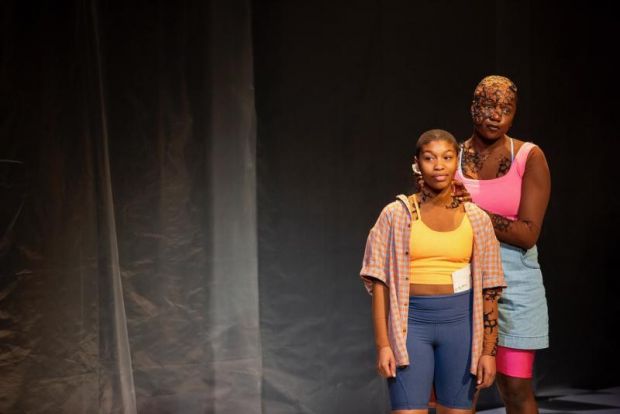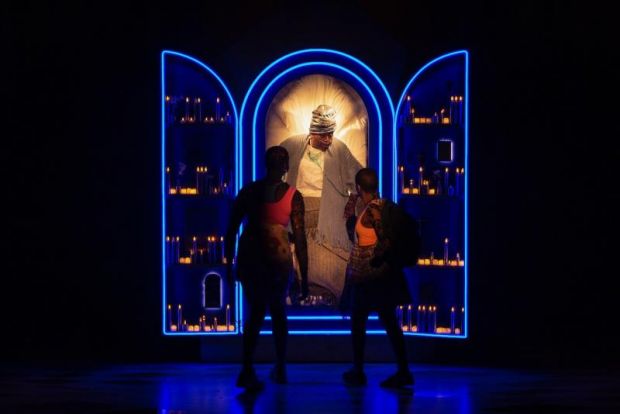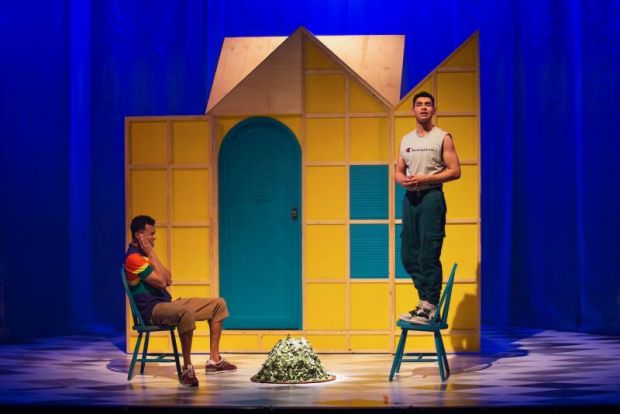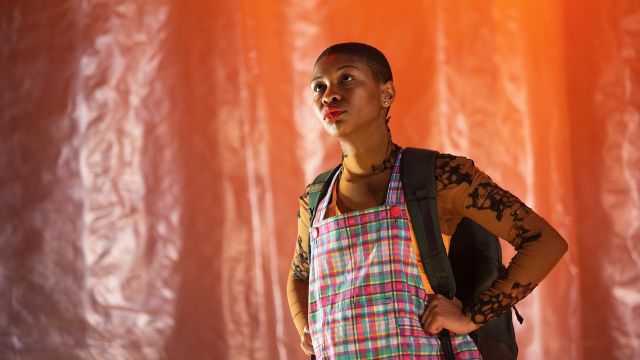Is God Is
A furious tale of vengeance. A knowing mix of genres past and present. An all-Blak American tale of a journey to bloody expiation. An award-winning play, produced in the US and at the Royal Court in London, Is God Is is the first all-Black play for the MTC – and co-directed by Blak directors Zindi Okenyo and Shari Sebbens.
Racine (Masego Pitso) and Anaia (Henrietta Enyonam Amevor) twenty-one, are twins. First joke: they look nothing like each other. Anaia is horribly scarred from burns, Racine less so, suffered from a house fire when they were three. Anaia’s scars are probably why she is ‘emotional’, shy, hesitant and withdrawn. Racine is a tough cookie – street-smart, pushy and decisive – maybe hot to hurt someone after the life they’ve had. They think they are orphans, but out of the blue, they get a letter from the mother they had thought killed in that same fire. Mama – or ‘She’ (Cessalee Stovall) – summons her daughters to rest home in the ‘Dirty South’.

She tells the truly terrible story of the fire and in a horrific reveal, show her daughters her charred body. Curiously, her story is only told, but it is, in our imaginations, one of the most violent incidents in this very violent play. She is dying and wants revenge on the Man (Kevin Copeland), the twins’ father, responsible for the fire. She wants him dead. Dead. Him and everyone he loves. The twins decide their Mama is ‘God’ – after all, She made them – and the mission she gives them is ordained. It is Fate. Anaia needs some persuasion, nevertheless, but the twins adopt more feminine attire (another joke) and set out for California…
Thus begins a trail of carnage that will involve The Man’s drunk, has-been lawyer, Chuck (Patrick Williams), and The Man’s second family – his neat, middle-class but harassed and oppressed wife Angie (Clare Chihambakwe) and self-absorbed teenage sons, also twins, Scotch (Darius Williams) and Riley (Grant Young) – and finally, The Man himself…
Aleshea Harris’ text, with its witty, punchy Black American patois, the bickering between the beautifully delineated twins - remorseless Racine and the more hesitant, ‘sensitive’ Anaia - and its set pieces of mayhem, is not naturalistic.

If the form were not enough, there are constant references or echoes - or tongue-in-cheek send-ups - of Greek tragedy, Jacobean revenge plays, Afropunk, Tarantino’s Kill Bill or Django Unchained, and spaghetti westerns. But Racine’s weapon of choice is an improvisation – a rock in a sock – and the violence, although it can erupt suddenly, is both stylised and, once we grasp where this is going, inevitable. That is, it rather ceases to be shocking – until the appearance of the truly menacing Man where it seems even the twins have met their match.
The theatricality is emphasised by Renée Mulder’s set design. Filmy curtains hang floor to flies and centre stage is a cute wooden house that resembles a backyard cubby or a kid’s drawing of ‘our house’. Racine and Anaia rotate this little house to indicate their journey, but it also cunningly folds out to yield She’s amazing shrine, the lawyer’s office and The Man’s family home. Jenny Hector’s lights and Joe Paradise Lui’s sound emphasise the unreality – or, better put, the metaphorical nature of this epic tale.

The stylisation, the non-naturalistic nature of the production, although perfectly in keeping with the playwright’s intentions, does rather keep us at a distance. With each successive murder, Racine is scarcely affected – she just keeps on, dragging her increasingly traumatised sister with her.
We are held, first, by the fact that all these characters are Blak in a story, as co-director Sebbens says, ‘usually reserved for white fellas.’ That is, the stereotypes of the ‘black woman’ in drama or fiction is upended by this revenge tale. We are held by the pace of it, by the comedy, by the lively but stylised, suggestive performances, and the inexorable drive toward the explosive, fiery climax. But it is a play to contemplate rather than having a visceral effect. For all its iconoclasm, its invention, we can identify with the situation – of rage, of heartless domestic violence and the blood-blinding need for revenge – rather than the characters on stage.
Michael Brindley
Photographer: Pia Johnson
Subscribe to our E-Newsletter, buy our latest print edition or find a Performing Arts book at Book Nook.

